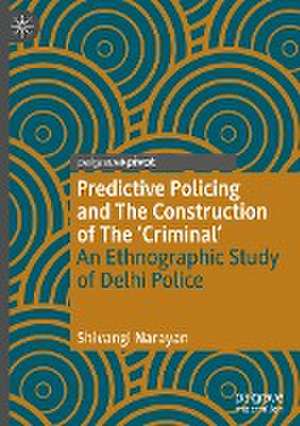Predictive Policing and The Construction of The 'Criminal': An Ethnographic Study of Delhi Police: Palgrave's Critical Policing Studies
Autor Shivangi Narayanen Limba Engleză Hardback – 12 aug 2023
Preț: 315.75 lei
Nou
Puncte Express: 474
Preț estimativ în valută:
60.47€ • 62.30$ • 50.66£
60.47€ • 62.30$ • 50.66£
Carte tipărită la comandă
Livrare economică 24 februarie-10 martie
Preluare comenzi: 021 569.72.76
Specificații
ISBN-13: 9783031401015
ISBN-10: 3031401018
Pagini: 133
Ilustrații: XIV, 133 p. 1 illus.
Dimensiuni: 148 x 210 mm
Greutate: 0.33 kg
Ediția:1st ed. 2023
Editura: Springer Nature Switzerland
Colecția Palgrave Macmillan
Seria Palgrave's Critical Policing Studies
Locul publicării:Cham, Switzerland
ISBN-10: 3031401018
Pagini: 133
Ilustrații: XIV, 133 p. 1 illus.
Dimensiuni: 148 x 210 mm
Greutate: 0.33 kg
Ediția:1st ed. 2023
Editura: Springer Nature Switzerland
Colecția Palgrave Macmillan
Seria Palgrave's Critical Policing Studies
Locul publicării:Cham, Switzerland
Cuprins
1. Introduction.- 2 . The ‘Digital Mapping Division’ of the Delhi Police.- 3. Delhi Police’s ‘Dial 100’ Call Centre.- 4. Mapping Crime in Delhi Police.
Notă biografică
Shivangi Narayan is an independent researcher based in India and affiliated with the Algorithmic Governance and Cultures of Policing (AGOPOL) Project, funded by Oslo Metropolitan University, Norway and the Norwegian Research Council. Prior to being a researcher, she was a journalist with a fortnightly magazine, ‘Governance Now’, where she covered technology policy in India. She has a bachelor's degree in Electronics and Communication Engineering and an MA, M.Phil and PhD in Sociology.
Textul de pe ultima copertă
This book provides a cultural investigation of the police in India and how it uses data and algorithmic tools for crime mapping.The book draws on an ethnographic study of Delhi Police's hotspot mapping endeavour. It provides a sociological investigation of the police in India and how they use data and algorithmic tools for crime mapping. It discusses how ‘criminals’ are constructed in these systems, typically, the marginalised residents of slums and immigrant colonies. It explores how the algorithm reifies existing assumptions and prejudices about 'criminals' as artificial intelligence systems are deeply intertwined with the culture and beliefs of those who make and use them. It pays special attention to the discriminatory practices of relevant police officers and how this ‘predictive’ policing perpetuates harm to the most marginalised. This book contributes to discussions around big data and surveillance studies broadly.Shivangi Narayan is an independent researcherbased in India and affiliated with the Algorithmic Governance and Cultures of Policing (AGOPOL) Project, funded by Oslo Metropolitan University, Norway and the Norwegian Research Council. Prior to being a researcher, she was a journalist with a fortnightly magazine, ‘Governance Now’, where she covered technology policy in India. She has a bachelor's degree in Electronics and Communication Engineering and an MA, M.Phil and PhD in Sociology.
Caracteristici
Explores the human and organizational side of predictive policing through a unique study in the Global South Provides rich context for the use of technologies for crime control purposes in India Speaks to scholars internationally interested in the digitalisation of police












